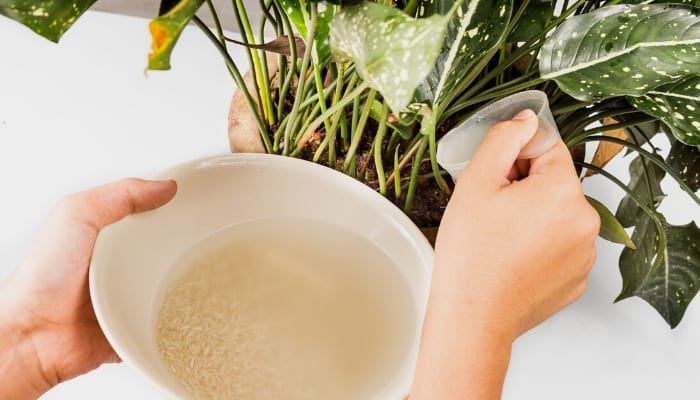
In the realm of natural plant care methods, rice water has emerged as a popular treatment option for promoting plant health and vitality. In this article, we’ll explore the process of making rice water for plants, its application techniques, benefits, and important considerations for using this organic treatment effectively.
I. Introduction
A. Importance of Natural Plant Care Methods
As more individuals seek eco-friendly and sustainable solutions for plant care, the importance of natural methods has gained prominence. Natural plant care methods minimize the use of synthetic chemicals and promote environmentally friendly practices that support the health and well-being of both plants and ecosystems.
B. Overview of Rice Water as a Plant Treatment
Rice water, a byproduct of rinsing or soaking rice, contains beneficial nutrients and compounds that can enhance plant growth and resilience. Rich in carbohydrates, vitamins, and minerals, rice water serves as a natural fertilizer and soil conditioner, providing plants with essential nutrients and promoting overall health and vitality.
C. Purpose of the Article
The purpose of this article is to provide a comprehensive guide to making rice water for plants, covering the preparation process, application techniques, benefits, and practical considerations for using this organic treatment. By understanding how to harness the power of rice water, gardeners can promote healthy growth and thriving plants in their gardens and landscapes.
II. Preparation of Rice Water
A. Selecting the Right Type of Rice
When making rice water for plants, it’s essential to choose the right type of rice. Unpolished or brown rice is preferred over white rice, as it retains more nutrients and beneficial compounds. Organic rice is also recommended to avoid exposure to pesticides and other harmful chemicals.
B. Rinse and Soak Method
The most common method for preparing rice water involves rinsing and soaking uncooked rice in water. Begin by rinsing the rice thoroughly to remove any dirt, debris, or excess starch. Then, soak the rice in water for several hours or overnight, allowing the nutrients to leach into the water.
C. Fermentation Process
Another approach to making rice water involves fermenting the rice water to enhance its nutrient content and efficacy. After soaking the rice, allow the water to sit at room temperature for a day or two, allowing natural fermentation to occur. Fermented rice water is believed to be more potent and beneficial for plants.
III. Application of Rice Water to Plants
A. Dilution Ratio and Frequency
Before applying rice water to plants, it’s important to dilute it with water to avoid over-fertilization and potential damage to plant roots. A common dilution ratio is one part rice water to two parts water, although this can vary depending on the concentration of the rice water and the specific needs of the plants. Apply rice water to plants once a week or as needed, depending on their growth stage and condition.
B. Methods of Application
Rice water can be applied to plants using various methods, including watering cans, spray bottles, or watering hoses. Ensure thorough coverage of the plant’s roots and soil surface, avoiding excessive runoff or pooling of water around the base of the plant. For potted plants, water the soil directly, allowing it to absorb the rice water gradually.
C. Targeted Plants and Benefits
Rice water can benefit a wide range of plants, including vegetables, fruits, flowers, and ornamentals. Its nutrient-rich composition promotes healthy growth, enhances flowering and fruiting, and improves overall plant vigor. Additionally, rice water can help prevent common plant diseases and pests, reducing the need for chemical interventions.
IV. Benefits of Using Rice Water for Plants
A. Nutrient Content
Rice water contains a variety of nutrients that are beneficial for plant growth and development, including carbohydrates, vitamins, minerals, and amino acids. These nutrients provide essential building blocks for plant cells, support metabolic processes, and contribute to overall plant health and vitality.
B. Growth Promotion and Disease Prevention
The application of rice water to plants can promote robust growth, increased yields, and enhanced resilience to environmental stressors. Additionally, rice water has been shown to suppress the growth of harmful pathogens and pests in the soil, reducing the risk of plant diseases and infestations.
C. Soil Conditioning and Plant Resilience
In addition to its direct benefits for plants, rice water also helps condition the soil, improving its structure, fertility, and water retention capacity. Healthy soil promotes strong root development, enhances nutrient uptake, and fosters a thriving ecosystem of beneficial microorganisms, contributing to the overall resilience and vitality of plants.
V. Tips and Considerations for Using Rice Water
A. Storage and Shelf Life
Store rice water in a clean, airtight container in a cool, dark place to prevent spoilage and contamination. Use rice water within a few days to a week to maintain its freshness and efficacy, discarding any leftover water that has become discolored or foul-smelling.
B. Monitoring Plant Response
Monitor plants closely after applying rice water to assess their response and adjust the application frequency or concentration as needed. Look for signs of improved growth, vigor, and flowering, as well as any adverse effects such as leaf discoloration or wilting, which may indicate over-fertilization or improper application.
C. Sustainable Practices and Alternatives
While rice water offers many benefits for plant health and growth, it’s important to use it in conjunction with other sustainable gardening practices, such as composting, mulching, and crop rotation. Additionally, explore alternative organic fertilizers and soil amendments to diversify nutrient sources and promote long-term soil health and sustainability.
In conclusion, making rice water for plants is a simple and effective way to promote healthy growth, enhance resilience, and foster thriving gardens and landscapes. By following proper preparation and application techniques, gardeners can harness the power of rice water to nourish and support their plants naturally, while minimizing the use of synthetic chemicals and promoting environmental sustainability.


